Governance and organisation
Snam’s governance system fosters dynamics that create value and facilitate the conditions for the proper and adequate interaction between the company and the context of reference. These objectives are pursued on the basis of Snam’s modus operandi principles: integrity, transparency and compliance with regulations, both internally and externally, to guarantee a clear and sustainable growth strategy that satisfies the interests of all the stakeholders. The governance system reflects this traditional model and is developed in compliance with the regulations in force and applicable across the sector (regulations for listed companies and unbundling regulations), in consideration of Italian and international best practices and the principles of the Group’s Code of Ethics.
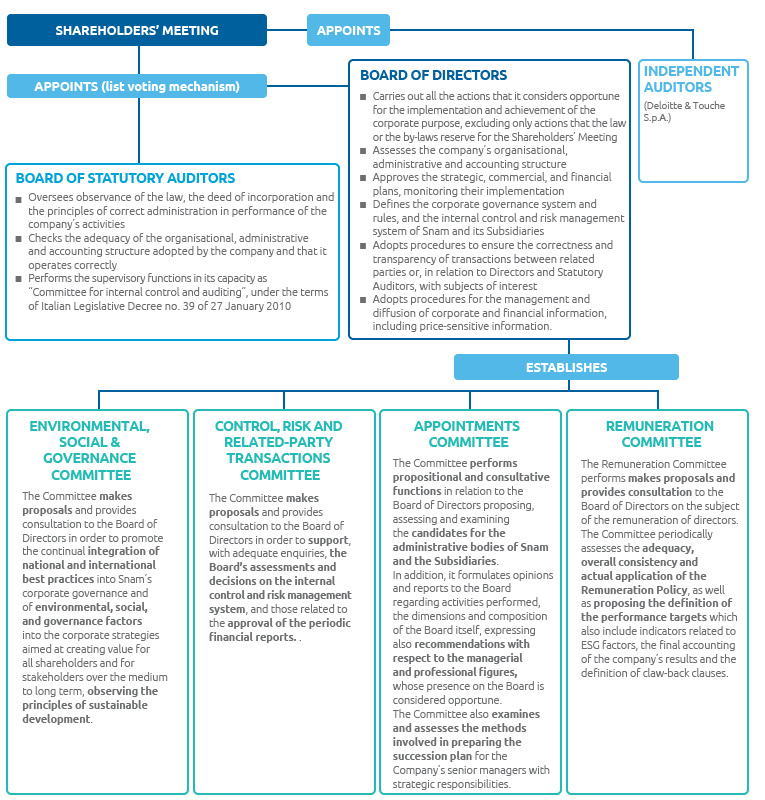
All BoD committees are chaired by
independent
directors
Furthermore, Snam adheres to the UN Global Compact, the most important international sustainable development initiative, aimed at promoting and spreading the ten global ethical principles concerning human rights, environmental protection, workers’ rights and anti-corruption.
As specified in the Company by-laws, following the approved amendment by the extraordinary shareholders’ Meeting of 2 February 2021, the Group aims to pursue successful sustainable practices through the creation of long-term values which benefit the shareholders, taking into consideration the interests of other stakeholders that are significant to the Company. Snam also operates under the frameworks of OECD Guidelines for Multinational Businesses, the UN Declaration of Human Rights the fundamental Conventions of the ILO guidelines and its own Code of Ethics, that is also an integral part of the Organisational Model of Legislative Decree 231/2001.
Snam already complies with a substantial proportion of the recommendations contained in the Corporate Governance Code published by the Corporate Governance Committee in January 2020 and which officially entered into force from 2021. Snam’s efforts and commitment lead to its classification, in 2020, as one of the best Italian Companies for corporate governance and integration of ESG factors (environmental, social and governance) in corporate strategies, according to the annual Integrated Governance Index survey carried out by ETicaNews and TopLegal.
The Meeting of 2 April 2019 established nine directors for a term of three years in office, due to expire at the date of the 2022 Meeting for the approval of the balance sheet at 31 December 2021.
BoD Composition
Snam’s Board of Directors instituted the following four Committees: the Remuneration Committee, the Appointments Committee, the Control, Risk and Related-Party Transactions Committee, the Environmental, Social & Governance Committee. The composition, roles and function of the Committees are governed by the Board and set out in specific regulations. The Board assigns Committee members. The Committees are composed of three non-executive directors, the majority of which are independent, except the Control, Risk and Related-Party Transactions Committee that is composed of independent directors only.
With the aim to optimise corporate processes, including the functioning, efficiency and effectiveness of the BoD, a Board Evaluation process has been implemented since 2019, aimed at assessing the Board and internal Committee operations by passing judgement on the activities carried out and identifying elements that could improve their performance. The Board Evaluation process has been entrusted to an independent advisor.
Considering the key principles of transparency and integrity, comprising the foundation of the corporate structure, Snam is committed to identifying the information flows between corporate bodies and effectively defining the internal Control and Risk Management System. Snam exercises management and coordination activities through the implementation of Guidelines on Corporate Governance which define the principles, contents, instruments and operating methods of strategic activities carried out by Snam in line with its own corporate governance system and the characteristics of its organisational structure while, at the same time, taking into account the legal autonomy and the principles of the correct corporate and business management of the subsidiaries.
More detailed information on governance and remuneration can be found in the document “2020 Report on corporate governance and ownership structure” and the “2021 Remuneration Report”, published online at www.snam.it at the same time as the Annual Report.
67%
OF THE BoD ARE INDEPENDENT DIRECTORS*
* 5 of 9 directors are qualified as independent pursuant to the Consolidated Law on Finance (TUF) and the Code of Corporate Governance and the Chairman is qualified as independent pursuant to the TUF.
BoD Composition
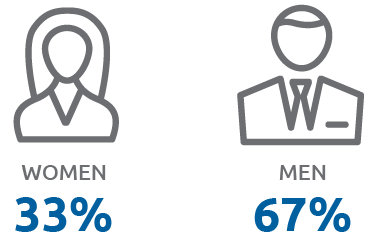
IN 2020, 12 BOD MEETINGS WERE CARRIED OUT WITH A 100% PARTICIPATION RATE

Diversity and skills matrix
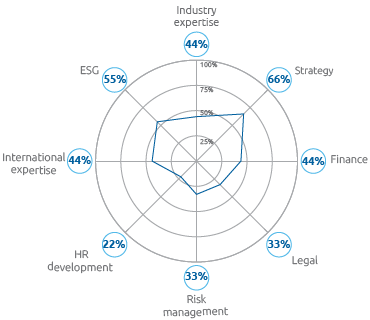
BoD Composition

Sustainability governance
The Board of Directors plays a central role in overseeing the company’s commitment to sustainable development along the value chain. Sustainability issues are always a central focus of the Board of Directors that dedicated 41% of its meetings to ESG issues in 2020.
Since 2016, the Board of Directors has been assisted with these tasks by the Sustainability Committee, replaced in May 2019 by the ESG Committee, that makes proposals and provides advice and is made up of three non-executive directors, two of which are independent, including the Chairman. The Committee is responsible for the promotion and integration of environmental, social and governance factors in corporate strategies in compliance with sustainable development, as well as the coordination of the preparation of non-financial information. In 2020, the ESG Committee met 18 times, with a participation rate of 98%, and addressed issues relating to climate change on various occasions, analysing, in particular, the Group’s results and Snam’s strategies with regards to reaching the established decarbonisation targets.
Climate change governance
In compliance with the TCFD recommendations, Snam is committed to maintaining and strengthening its governance system with the aim to support the Company initiatives in the fight against climate change.
To this end, activities have been implemented to ensure the comprehensive monitoring by the Board of Directors of climate change risks and opportunities, and opportunities aimed at ensuring the correct management of these issues by the management department when running its activities.
Based on the proposal of the CEO, the Board of Directors plays a fundamental role in spreading and integrating a culture aimed at reversing climate change. As such, the Board regularly assesses and approves:
- climate change and energy transition targets, an integral part of corporate strategies, included in the annually approved strategic Plan;
- Snam’s strategic risks, including annually assessed climate change risks;
- ithe share-based long-term incentive plan with goals relating to reducing gas emissions, consistent with the Strategic Plan guidelines for the CEO and managers, with a greater impact on annually approved company results;
- the annual sustainability results and the HSE reassessment, including their impacts on climate change;
- institutional reporting that comprises the half-year and annual Report (including the Consolidated Non-Financial Statement – NFS), the Sustainability Report and the Financial Disclosure on Climate Change;
- the information provided by the Committees and, specifically by the ESG Committee, pursuant to the relative Regulation on information disclosed to the Board after every Committee meeting.
As one of the initiatives aimed at making climate change a priority for management bodies, the new Plan envisages the continuation of board induction sessions for the BoD, as a means to keep its members informed about climate change issues and initiatives. In particular, according to the ESG Scorecard, it was foreseen that the BoD dedicates at least 40% of its time on ESG matters during meetings or board induction sessions.
Snam’s organisational model
We manage our business in accordance with the Corporate System Framework, the organisational and procedural system applied across all Group companies in Italy and abroad, created to ensure that the system of rules governing the business is clear, simple and organic. The system is inspired by the Code of Ethics13 and is based on management policies, described in the following chapters, based on the principles enunciated by the United Nations Universal Declaration of Human Rights, the Fundamental ILO Conventions and the OECD Guidelines for Multinational Enterprises.
In order to successfully implement this system, managerial actions need to be based on the allocation of specific objectives to each position of responsibility and on the transparent assessment of results, thereby enabling continual improvements in the effectiveness and efficiency of corporate processes.
The organisational structure of Snam features four business units and staff functions, designed with a view to simplifying processes, efficiency and continuous improvement. The business units focus on four key Snam activities: (i) international development, (ii) management of Italian subsidiaries and development of technical services based on specialist skills and know-how for gas operators, (iii) energy transition business development, and (iv) hydrogen business development.
Reorganisation of the corporate structure in 2019 was required to facilitate the integration and optimisation of corporate processes, especially in the context of energy transition and decarbonisation. All business units linked to biomethane, hydrogen, sustainable mobility and energy efficiency and international activities were implemented in 2019. In 2020, also in consideration of the impact that such activities will have on the 2020-2024 Strategic Plan, the role of these business units was further strengthened.
Snam’s remuneration and incentive system
Snam is committed to providing a remuneration system that always aligns with international best practices, compliant with European and Italian regulations, and which supports and fosters the development of the Company consistently with its Strategic Plan.
Snam’s remuneration system, guided by the Remuneration Committee, is aimed at recognising the responsibilities assigned to it, the results it achieves and the quality of the professional contribution provided by the Company management department and complies with the principles of people promotion and equal opportunities, established in the Code of Ethics and present, for some time, in Snam’s organisational culture.
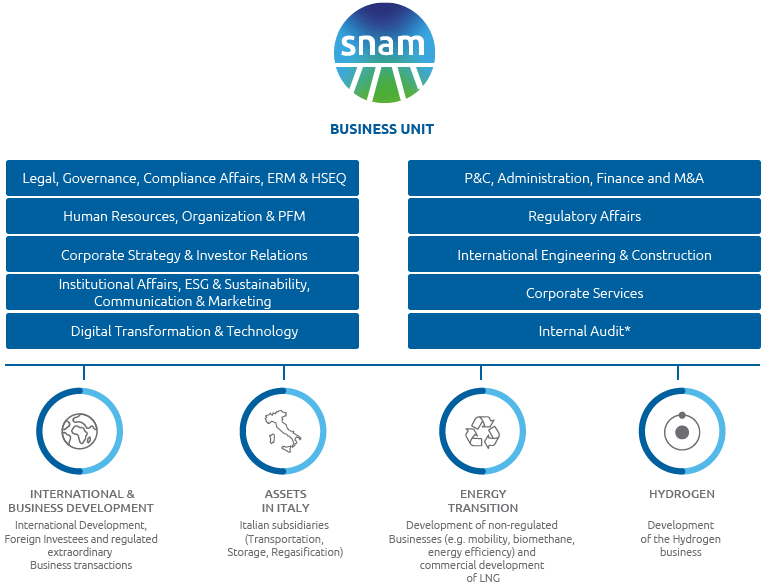
(*) On behalf of the Board of Directors, the Chairman coordinates and makes use of the Head of Internal Audit, who reports hierarchically to the Board.
The remuneration system represents a fundamental instrument aimed at attracting, retaining and motivating team of high-quality management personnel who are able to run the company successfully, while aligning its actions with shareholders’ interests and promoting the creation of value in the medium-long term.
For managers, the remuneration system breaks down into two parts: fixed remuneration, with possible annual adjustments for merit or progression of roles/responsibilities, and variable remuneration with incentives aimed at promoting professional contribution in the short-term, by assigning an annual monetary incentive (IMA), as well as in the medium-/long-term, by assigning a long-term share-based incentive (ILT). Also, managers are subject to claw-back mechanisms, aimed at recovering the variable portion if the resulting compensation is not due if it was earned based on targets that were attained as a result of malicious or grossly negligent behaviour or that were proven to be manifestly incorrect. Finally, the Total Reward Statement is an information package on the breakdown of individual remuneration that guarantees the promotion and transparency of the remuneration system for managers.
For the rest of the corporate population, Snam adopts a short-term variable incentive plan intended to reward best performance and the young resources with potential for development. What is more, all companies in the Group implemented a “Participation Bonus”, instituted by the National Collective Labour Agreement, based on the performance of profitability and productivity parameters, measured in relation to the targets agreed upon every year between the company and trade-union representatives.
The Snam 2020 Remuneration Policy14 for Directors, Auditors and Managers with strategic responsibilities15 was approved in 2020. The document defines the new 2020-2022 long-term share-based incentive plan that prescribes the assignment of Snam ordinary shares after achieving performance goals measured over a three-year period. Sustainability plays an increasingly important role in the new Remuneration Policy which includes: the frequency index and the accident severity index, inclusion in the DJSI, FTSE4GOOD and CDP indices, and the Forestation Project.
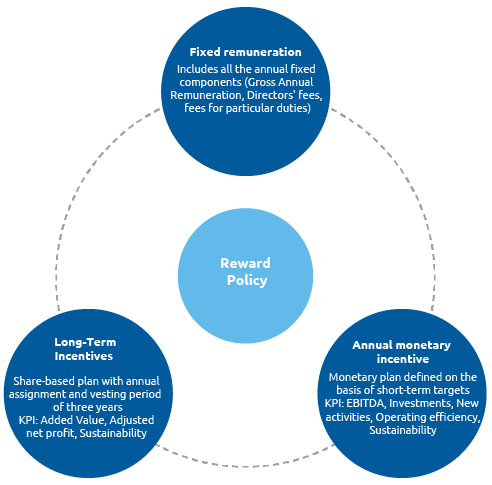
13 Snam’s Code of Ethics can be viewed on the Company’s website at the following link www.snam.it/export/sites/snam-rp/repository/file/Governance/codice-etico/codice_etico.pdf.
14 The Snam 2021 Remuneration Policy for Directors, Auditors and Managers with strategic responsibilities will be approved during the shareholders’ Meeting of 28 April 2021.
15 At Snam, managers with strategic responsibilities differ from Directors and Auditors, and have the following roles: Chief Financial Officer; Chief International & Business Development Officer; General Counsel; Executive Vice President Human Resources & Organization & PFM.